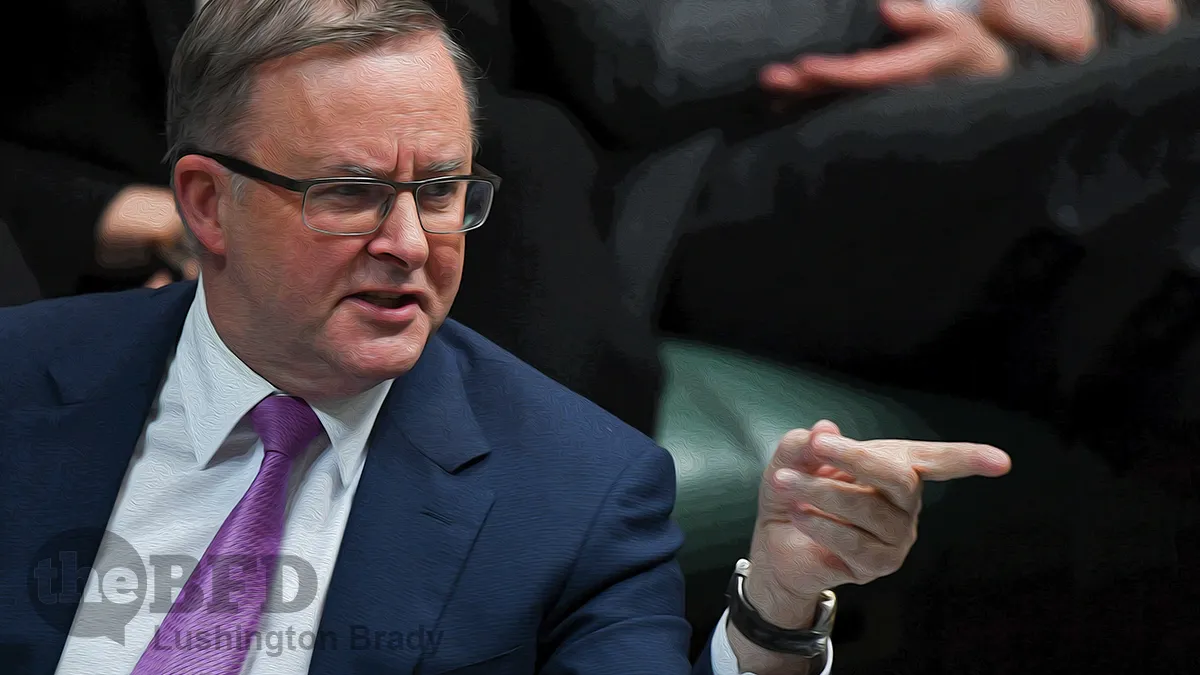Table of Contents
Timing is everything in comedy — and in politics, too. There’s never a good time for a government to belt its most productive sector with what I call “puffy pants taxes”*. But there are definitely worse times to do so.
Such as when said sector is on the brink of a massive downturn, along with the rest of the economy.
The Anthony Albanese government is showing all the comic timing of someone smacking a custard pie into Tsutomu Yamaguchi’s face at 11:03 on the morning of August 9, 1945.
Australia’s resources and energy export earnings face a $68bn hit, with record LNG and thermal coal prices expected to fall on the back of a slowdown in global demand and easing of supply-chain disruptions.
New forecasts show commodity prices on track to return to pre-pandemic levels as markets stabilise following Russia’s invasion of Ukraine, heaping pressure on Treasurer Jim Chalmers, who has warned of looming budget spending blowouts and revenue shortfalls […]
upgraded forecasts predict resources and energy export earnings will fall to $391bn in 2023-24, adding stress to the nation’s debt and deficit explosion over the decade and projected $11bn in higher deficits in 2024-25 and 2025-26.
The Australian
So, what is the Labor government doing, in response? Imposing onerous new regulations, including price caps, on the energy sector — with the Greens pulling the strings. In other words, it’s a rinse-and-repeat of the Rudd-Gillard-Rudd years.
Passage of the government’s energy price relief bill has moved the nation markedly to the left on domestic policy such as energy, business regulation and even enlarging the government’s footprint in shaping household spending choices on appliances. On top of the leftward lurch on industrial relations towards rigid regulation, it is a major shift. Thursday was all about Labor’s intervention in markets and its willingness, yet again, to dip into taxpayers’ funds to sweeten the politics.
In fact, the policy is almost certain to lead to even more blowouts in household energy bills, as energy companies abandon suddenly-unprofitable gas and coal and hawk vastly more expensive “renewables”.
At the same time, the obvious threat to exports is alarming some of Australia’s closest allies.
As Robert Gottliebsen wrote this week, local and international companies have invested billions of dollars to develop Australian gas resources on the basis of a set of rules that gave them independence in long-term production, marketing and pricing: “Western countries around the world attract capital to develop their resources on the basis of these clear rules.” Poorer countries with political instability, particularly in Africa, are seen as high-risk places to invest because governments often change the rules. Energy producer Santos accused the Prime Minister of running a Soviet-style nationalisation policy. Companies would need fiscal stability agreements with the government before new gas supply projects could take investment decisions to secure capital, “just as would be the case if they were operating in Argentina, Venezuela or Nigeria”, Santos chief executive Kevin Gallagher says.
The Greens, of course, are lapping it up and crowing mightily — as well they might.
When he was campaigning, Mr Albanese reassured voters that Labor would not make deals with the Greens on climate policy. “If we win government we will implement our plan, not negotiate with fringe groups,” he said in February. “I won’t be negotiating or doing deals with the Greens after the election.” Despite that, when the Greens helped the government pass its legislation in the Senate, they did so at a price, forcing Mr Albanese to dip into taxpayers’ funds to subsidise low-income households to replace gas stoves and heaters with electric appliances. These cost several hundred to several thousand dollars.
Australian Greens leader Adam Bandt took credit.
Because of course, he did: the Greens are once again revelling in having a weak, hard-left Labor dog that the Green tail wags as it likes.
What’s even more remarkable is that Climate Change and Energy Minister Chris “Boofhead” Bowen freely acknowledges the astonishing cost of “energy transition”, yet blithely assumes that it’ll all just happen… somehow.
Last month, Energy Minister Chris Bowen gave an insight into the challenge ahead to meet the target of reducing emissions by 43 per cent by 2030, with 82 per cent of the national electricity market powered by renewables. Australia must install 22,000 500-watt solar panels every day for eight years, he reportedly said, along with 40 seven-megawatt wind turbines every month, plus 10,000km of additional transmission lines.
The Australian
Hands up anyone who’s ever held a job outside of politics who actually thinks this is even remotely achievable.
Yet, these clowns just roll their honking, hooting little green car, regardless.
The rest of us had just better pray. Not just for unusually clement weather that won’t put too much strain on a grid constantly teetering on the edge of collapse, but for a golden goose that’ll help us pay our skyrocketing bills for what energy we still get — and pray even harder that somewhere out of the political wilderness emerges an opposition worth the name, who’ll put an end to the Climate Cult madness gripping the elite.
*A reference to The Simpsons, “Radioactive Man” episode, where oily Mayor Quimby tries to capitalise on a movie being filmed in Springfield:
The, uh, city has just passed another tax on puffy directing pants.
But I don’t wear puffy pants!
I meant a, uh, tax on not wearing puffy pants.








